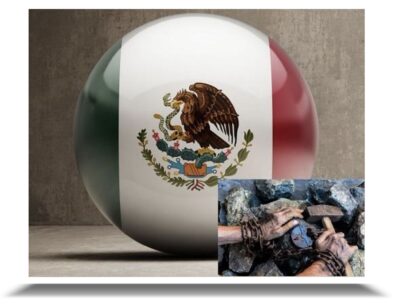Recent Update on Forced Labor in Mexico
By Brenda Cordova, Braumiller Law Group Mexico Legal Counsel
Mexico has recently published several legal instruments aimed to prevent and investigate forced and compulsory labor, including child forced or compulsory labor (forced labor). This impacts labor standards implemented by employers not just within the Mexican territory, but also from abroad, because starting May 18, 2023, goods produced in any country under forced labor conditions are restricted for importation into Mexico.
These new obligations are not imposed due to internal or autonomous polices, instead, they are the result of compromises that Mexico has agreed to internationally. First, it is a member of the International Labor Organization (ILO), and thus it is required to comply with the various ILO proposals, agreements, instruments, and the like, such as the Protocol of 2014 to the Forced Labor Convention, 1930. This protocol was adopted by Mexico on November 10, 2022, and is aimed to prevent and eliminate the use of forced labor and to protect worker´s rights. Second, it has a free trade agreement with Canada and the United States (USMCA) that includes a chapter for Labor matters. Article, 23.6, of this treaty sets forth that the Member countries shall prohibit the importation of goods into their territory from other sources produced in whole, or in part, by forced or compulsory labor, and the three countries shall establish cooperation for the identification and movement (detention) of goods produced by forced labor.
Therefore, based on those international instruments, on February 17, 2023, the MX government published a decree to restrict the importation of goods into Mexico produced in whole or in part under forced labor conditions. This decree became effective on May 18, 2023.
According to this decree, the MX Minister of Labor and Social Welfare (STPS – Secretaria de Trabajo y Previsión Social) has the authority to initiate proceedings to investigate labor standards in place by companies producing goods. The request to introduce such proceedings can be initiated by STPS or by anyone before STPS. This request must be in writing and shall include several elements such as: a) name and address of the applicant, b) legal grounds and motives for such request as well as facts and evidences, c) description and harmonized tariff code of the goods allegedly produced under forced labor conditions, technical specifications, function, use, nature, components, and inputs for the production of such good, d) name and address of the producer, e) region or country of origin or export, f) signature of the applicant. The request must have attachments supporting the above.
The STPS may request the applicant provide any clarifications or additional information. Should STPS consider there is enough evidence to initiate the proceedings, it will coordinate with the authorities from abroad to investigate whether the goods were produced under forced labor conditions. If this is not the case, the STPS shall notify the importer of the goods about the proceeding so that the importer may respond accordingly. The STPS has 180 workings days to determine the existence, or not, of forced labor in the production of the goods. The STPS determinations in this regard will be published on its website for public access.
In May, 2023, the STPS published a guideline with additional information and clarification regarding the proceedings to request a forced labor investigation. For example, it includes the different stages, periods of time for the investigation, mechanism to restrict the import of goods, tools to release the STPS determination, customs regime of the imported goods subject to verification, the type of documents that can serve as evidence (i.e., affidavits, press releases, photographs, videos, etc.), additional details for the request of information to foreign authorities, communications between the STPS and the National Agency of Mexican Customs about the goods restricted for importation, and the criteria to determine forced labor, among other data.
According to this guideline, the criteria to determine the existence of forced labor will take into consideration indicators from the ILO, such as abuse to the employee´s vulnerability, lies and deception from the employer, restrictions on employee´s freedom of movement within the workspace, isolation of employees, sexual and physical violence of employees, intimidation and threats by employer, retention of personal documents by employer, withholding of salaries and wages by employer, debt bondages by employer, work and life conditions and extra hours.
The recent published laws regarding forced labor in Mexico are the result of international commitments by the Mexican government. This means it will pay closer attention to compliance. Therefore, companies importing goods into Mexico should internally review the labor standards of their foreign suppliers to make sure there are no forced labor indicators. In the case that a company receives a notice from the labor authorities from Mexico with the purpose to investigate forced labor, it should work on this matter as diligently and as soon as possible because the applicable deadlines can be aggressive, especially where the parties are located abroad.
Mexican authorities tend to be extremely strict and formalistic at the time of reviewing documents and applying the law, therefore, any response to an investigation initiated by the STPS should be well documented and include detailed records, documents, and evidence regarding the labor conditions. Failing to provide complete, clear documents may result in a denial to import goods into Mexico which may seriously affect companies´ global supply chain
 Brenda Cordova, Braumiller Law Group, Mexico Legal Counsel
Brenda Cordova, Braumiller Law Group, Mexico Legal Counsel
She is an attorney from Mexico. She graduated from the Universidad Autonoma de San Luis Potosi. She holds an LL.M. degree on International Trade fromThe University of Texas at Austin. She is currently pursuing a PH.D. on Customs and Foreign Trade Law from the Centro Universitario de Estudios Juridicos.
Brenda holds a certification on International Negotiations from the Colegio de Mexico, a certification on introduction to American Law from the University of Pennsylvania, and a certification on the Trade Facilitation Agreement and on Rules of Origin from the World Trade Organization. She is currently pursuing a certification on Foreign Trade and Customs Operation at the ITAM.
Brenda has been involved in Mexican Customs and trade matters since 1994 in the following areas: classification ruling requests, NOMs, import/export procedures, NAFTA/USMCA origin verifications proceedings, rules of origin, IMMEX compliance, foreign investment, and incorporation procedures, among other related topics.



























